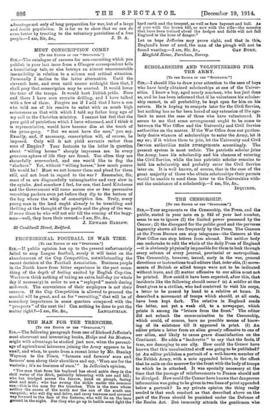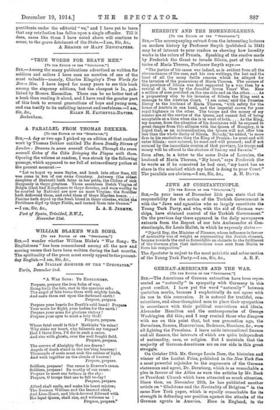THE CENSORSHIP.
[To THE EDITOR OF THE srsoraroa."3 SIR,—Your arguments re the Censorship, the Press, and the public, stated in your note on p. 842 of your last number, seem to me to ignore (I) the limited power possessed by the Censor ; (2) the disregard for the public good and the perverse ingenuity shown all too frequently by the Press. The Censors at the Press Bureau can stop telegrams—the Censors at the Post Office can stop letters from abroad. But neither body can undertake to edit the whole of the daily Press of England —it is obviously physically impossible for them to look through every column of every journal, provincial or metropolitan. The Censorship, however, issued, early in the war, general directions or instructions to all editors that, inter alio, (1) move- ments of British or allied troops were not to be indicated without leave, and (2) matter offensive to our allies must not be printed. How could it have been expected, after this, that incidents like the following should occur (a) A soldier at the front gives to a civilian, who had contrived to visit his corps, a letter to be passed by hand to a relative at home. It described a movement of troops which should, at all costs, have been kept dark. The relative in England sends the letter, not yet a week old, to a newspaper, which prints it among its "letters from the front." The editor did not submit the communication to the Censorship, which could, of course, have no possible means of know- ing of its existence till it appeared in print. (b) An editor prints a letter from an alien grossly offensive to one of our allies, and likely to cause grave dissatisfaction on the Continent. He adds a "leaderette" to say that the facts, if true, are damaging to our ally. How could the Censor have known that this unsubmitted stuff was going to be published? (c) An editor publishes a portrait of a well-known member of the British Army, with a note appended below, to the effect that he sails on the morrow for the front with the body of troops to which he is attached. It was specially necessary at the time that the passage of reinforcements to France should not be divulged. Row could the Censor have known that dangerous information was going to be given in two lines of print appended below a portrait? In my private opinion the thing really needed is that such conduct as that described above on the part of the Press should be punished under the Defence of the Realm Act. But immunity attends the gentlemen who
pontificate under the editorial " we," and I have yet to learn that any retribution has fallen upon a single offender. Till it does, cases like those I have noted above will continue to occur, to the grave detriment of the State.—I am, Sir, &c., A READER OF MANY NEWSPAPERS.







































 Previous page
Previous page